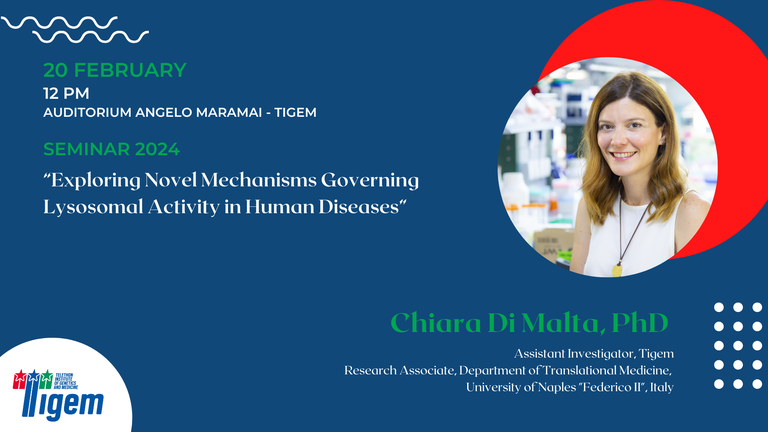Chiara Di Malta, PhD - "Exploring Novel Mechanisms Governing Lysosomal Activity in Human Diseases"
- When Feb 20, 2024 from 12:00 PM to 01:15 PM (Europe/Berlin / UTC100)
- Where Tigem Auditorium Angelo Maramai
- Contact Name Chiara Di Malta
- Contact Phone 08119230659
-
Add event to calendar
iCal

- https://www.tigem.it/newsroom/seminars/chiara-di-malta-phd-exploring-novel-mechanisms-governing-lysosomal-activity-in-human-diseases
- Chiara Di Malta, PhD - "Exploring Novel Mechanisms Governing Lysosomal Activity in Human Diseases"
- 2024-02-20T12:00:00+01:00
- 2024-02-20T13:15:00+01:00
Chiara Di Malta, PhD
Assistant Investigator, Tigem
Research Associate, Department of Translational Medicine,
University of Naples "Federico II", Italy
Short CV
Abstract
The excessive activation of MiT/TFE transcription factors (TFs), particularly TFEB and TFE3, is implicated in Birt-Hogg-Dube syndrome (BHD), an autosomal dominant inherited disorder, in which affected individual are at risk of developing benign cutaneous fibrofolliculoma, bilateral pulmonary cysts, spontaneous pneumothoraxes and kidney cancers. However, the complex network of genes and pathways regulated by these TFs poses challenges for targeted therapy. Therefore, identifying the target genes of TFEB/TFE3 involved in disease initiation and progression could represent a crucial step towards designing specific and effective therapeutic strategies to mitigate the disease-related phenotypes. By integrating transcriptomic data from patient biopsies and cell lines with TFEB Chip-seq datasets, we have identified a list of candidate factors that promote kidney pathology in BHD. Remarkably, many of these genes localize, at least in part, to the lysosome, potentially serving as novel regulators of lysosomal activity downstream of TFEB. Our objective is to elucidate the significance of specific lysosome related TFEB targets in the initiation and progression of MiT/TFE associated diseases and to functionally characterize a novel mechanism regulating TFEB localization, which could serve as a new therapeutic target for the treatment of BHD syndrome. Importantly, preliminary data indicate that the relevance of our study could extend to lysosomal storage disorders, allowing us to identify novel therapeutic interventions for the treatment of these devastating genetic diseases.
Assistant Investigator, Tigem
Research Associate, Department of Translational Medicine,
University of Naples "Federico II", Italy
Short CV
Abstract
The excessive activation of MiT/TFE transcription factors (TFs), particularly TFEB and TFE3, is implicated in Birt-Hogg-Dube syndrome (BHD), an autosomal dominant inherited disorder, in which affected individual are at risk of developing benign cutaneous fibrofolliculoma, bilateral pulmonary cysts, spontaneous pneumothoraxes and kidney cancers. However, the complex network of genes and pathways regulated by these TFs poses challenges for targeted therapy. Therefore, identifying the target genes of TFEB/TFE3 involved in disease initiation and progression could represent a crucial step towards designing specific and effective therapeutic strategies to mitigate the disease-related phenotypes. By integrating transcriptomic data from patient biopsies and cell lines with TFEB Chip-seq datasets, we have identified a list of candidate factors that promote kidney pathology in BHD. Remarkably, many of these genes localize, at least in part, to the lysosome, potentially serving as novel regulators of lysosomal activity downstream of TFEB. Our objective is to elucidate the significance of specific lysosome related TFEB targets in the initiation and progression of MiT/TFE associated diseases and to functionally characterize a novel mechanism regulating TFEB localization, which could serve as a new therapeutic target for the treatment of BHD syndrome. Importantly, preliminary data indicate that the relevance of our study could extend to lysosomal storage disorders, allowing us to identify novel therapeutic interventions for the treatment of these devastating genetic diseases.
